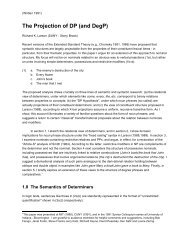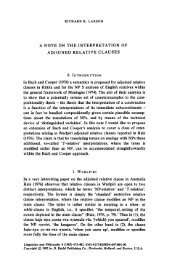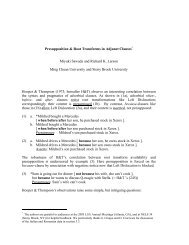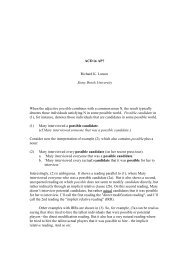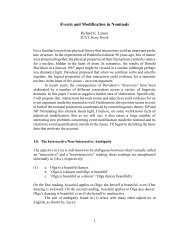Intensional Transitive Verbs and Abstract Clausal Complementation
Intensional Transitive Verbs and Abstract Clausal Complementation
Intensional Transitive Verbs and Abstract Clausal Complementation
You also want an ePaper? Increase the reach of your titles
YUMPU automatically turns print PDFs into web optimized ePapers that Google loves.
<strong>Intensional</strong> <strong>Transitive</strong> <strong>Verbs</strong> <strong>and</strong> <strong>Abstract</strong> <strong>Clausal</strong> <strong>Complementation</strong><br />
In (11a), the adverb can be understood as modifying the matrix verb need or the embedded verb have.<br />
On the former (nonpreferred) reading, it is the needing that will be tomorrow (cf. Tomorrow Max will need<br />
to have a bicycle). On the latter reading, it is the having that will be tomorrow (cf. Max will need to have a<br />
bicycle, <strong>and</strong> he must have it tomorrow). This ambiguity can be analyzed as directly arising from the two<br />
possible attachments for tomorrow:<br />
(12) a. [Max will need [PRO to have a bicycle tomorrow]]<br />
b. [Max will need [PRO to have a bicycle] tomorrow]<br />
If an underlying clausal analysis is provided for (11b), then its ambiguity can be analyzed in a completely<br />
parallel way (13):<br />
(13) a. [Max will need [ CP PRO HAVE a bicycle tomorrow]].<br />
b. [Max will need [ CP PRO HAVE a bicycle] tomorrow]].<br />
If we reject this approach, however, we not only need to provide an alternative analysis of the ambiguity in<br />
(11b), we must also explain why ambiguity fails to arise with extensional transitives that do not select<br />
clauses - why, for example, no comparable ambiguity arises in (14):<br />
(14) Max will ride/repair a bicycle tomorrow. (unambiguous)<br />
In a similar vein, McCawley (1974) observes that intensional transitives like want allow for the<br />
possibility of two non-agreeing time adverbs (15a), whereas garden-variety transitives like paint do not<br />
(15b). Again, if an underlying clausal analysis is provided for (15a), then the coherence of this example is<br />
directly comparable to the coherence of (16):<br />
(15) a. A week ago Bill wanted your car yesterday<br />
b. #A week ago Bill painted your car yesterday<br />
(16) [A week ago Bill wanted [ CP PRO to have your car yesterday]].<br />
If we reject the biclausal approach, we require an alternative (<strong>and</strong> presumably unrelated) analysis of why<br />
(15a) involves no "temporal clash". 7<br />
1.4 Ellipsis<br />
Evidence for clausal complementation with "transitive" want is provided by the underst<strong>and</strong>ing of elliptical<br />
examples like (17): 8<br />
7 To our knowledge, this correlation of facts has simply not been addressed in non-clausal accounts of intensional<br />
transitive complements. See for example, Montague (1974), which analyzes the complements of intensional<br />
transitives as denoting properties of properties; see also the latest work in this framework, e.g., Zimmermann (1993),<br />
Moltmann (1997).<br />
5



